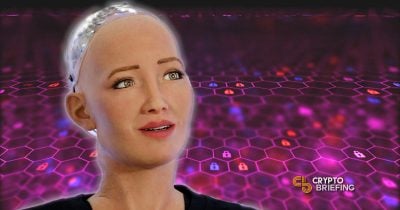Blockchain AI: Decentralizing The Language Of The Gods

Share this article
It wasn’t that long ago that Artificial Intelligence (AI) was a distant dream. But automated vehicles are around the corner. Uber cars send data to the company’s research labs, to teach robots to drive. And what middle-class home is complete without an Alexa, organizing lives and shopping lists?
So how does blockchain fit into all of this? Until recently, not very well. The two technologies developed in parallel, but rarely overlapped. But that may be about to change. During the Malta Blockchain Summit last week, Hong Kong-based engineering company Hanson Robotics, showcased Sophia: a social humanoid robot.
She (if that’s the correct pronoun) still has limitations. Journalists have to ask their questions through a specially designed microphone that cuts out background noise, in a near-silent room. Her knowledge base is also limited; a Hanson engineer manages her interactions from a laptop hooked up at the back of the room. The wifi is irregular, so a long ethernet cable connects her to the back of the wall.
Some of her responses are pre-programmed with a basic understanding of cryptocurrency, reflecting the background of most of the journalists in the room. Engineers explain that at the end of the conference, most of her responses and knowledge-base will be removed.
But these are mild quibbles. Although the display is impressive, Hanson wants to do better. The end-goal is to have an autonomous robot, that can speak lucidly on topics without assistance and prodding from a host of engineers.
Blockchain AI: Can they mix?
Hanson Robotics has started collaborating with SingularityNET (AGI), a decentralized AI marketplace upon which Crypto Briefing has reported before. The end goal is for Singularity to become a platform where different AI entities can communicate and even trade with one another, using the exchange’s native AGI token.
That’s not there yet, partly because there aren’t enough AIs around, and also because existing entities are effectively isolated. Sophia is a case in point: currently, Hanson Robotics has to manually manage what she knows and ultimately determine her responses and interactions with the outside world. SingularityNET believes their blockchain can be used as a data repository for AI entities to freely pull the information and data they need to actually function.
“Crucial data sets exist in siloes; they are not democratized,” Arif Khan, SingularityNET’s VP for marketing, told Crypto Briefing after the press conference with Sophia. “This hinders AI development. Large tech companies still hold the keys to further development, but most work for-profit. What we can do with blockchain is effectively make this knowledge open-source”.
Khan says that Sophia learns from her experiences, even during press briefings. This improves her responses and ability to think independently long term, but at the moment, there’s no way any of this information can be shared with other AIs. SingularityNET’s blockchain can be used as a databank for all of these experiences. When one AI learns something, other automatons can learn about it, too.
“I may be being dramatic, but AI is sort of like the language of the gods”, Khan explains. “Currently loads of independent robotics companies are in an arms race with big tech. It’s great that AI is now a serious sector, but the motivations behind companies like Facebook is ultimately the shareholders dividend.”
“Is this how we should enter this new era?” Khan asked, rhetorically.
Sophia robot is just the beginning
Robots may not literally walk amongst us yet (and Sophia doesn’t have legs), but they are penetrating all aspects of our lives. Like the internet, society will one day wake up and struggle to remember a world without artificial intelligence.
Tech is hierarchical, and still governed by the bottom line. But the Blockchain’s contribution to AI might be to change this dynamic. If humans start manufacturing sentient life, blockchains can prevent it from being determined at the end of a corporate balance sheet.
Disclaimer: The author is not invested in any cryptocurrency or token mentioned in this article, but holds investments in other digital assets.
Share this article
